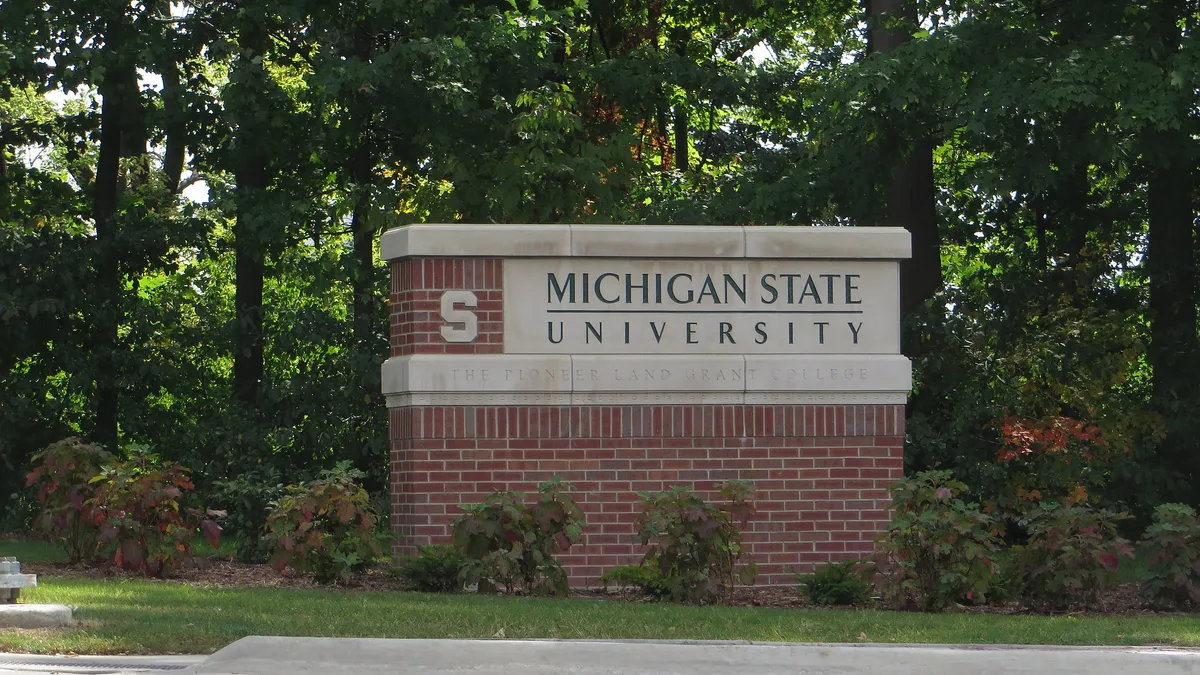Dive Brief:
- Michigan State University’s faculty senate voted no confidence in the institution’s trustees Tuesday, escalating ongoing tensions between the academic branch of the prominent public institution and its governing board.
- The faculty senate, which approved the no confidence vote 55-4, is objecting to purported board overreach into academic matters. The trustee board recently hired a law firm to investigate the ouster of Sanjay Gupta, the university’s former business school dean, who allegedly failed to report sexual misconduct.
- Board members have also expressed concerns about Michigan State University’s president, Dr. Samuel Stanley Jr., certifying Title IX reports before trustees completed those legally required reviews. Title IX is the law banning sex-based discrimination and sexual violence in federally funded schools.
Dive Insight:
The public’s eye has been on Michigan State since news reports last month revealed some trustees were attempting to force out Stanley before his contract expires in 2024.
At issue were allegations that Stanley last year incorrectly confirmed to the state that university leaders had reviewed Title IX reports. Michigan requires a public institution’s chief executive and one member of its governing board to affirm such reports.
Stanley pushed back on the accusations, saying he “faithfully complied with this Michigan certification process” and arguing some board members had failed their part of the procedures.
Neither the trustee board chair nor a Michigan State spokesperson responded to a request for comment Wednesday.
Title IX issues are a sore spot for Michigan State, which has lost two presidents as it endured one of the most significant sexual violence scandals in recent higher education history.
Former university sports doctor Larry Nassar was arrested in 2016 and later convicted for sexually abusing dozens of gymnasts and other athletes under the guise of medical treatment.
In 2018, former president Lou Anna Simon left the role amid concerns that Michigan State officials were aware of Nassar’s misconduct but did not do enough to stop it. Despite facing criticism for her handling of the case, Simon received a $2.45 million retirement package after stepping into positions as president emeritus and professor emeritus.
John Engler, a former Michigan governor, then took over as interim president but departed after less than a year. Engler caught flack for tone-deaf comments about survivors of Nassar’s abuse.
The case involving Gupta, the former business school dean, stemmed from an incident at an April gala. Another leader in the university’s business college allegedly became drunk and may have inappropriately touched at least one student, Crain’s Detroit Business reported.
Gupta was reportedly aware of this episode, but did not report it, and was later forced to resign.
Stanley’s fate remains unknown, but the faculty senate has discouraged his firing unless trustees are more transparent. Last month, the senate passed resolutions urging the board to publicly share more information about Stanley and to undergo professional development on governance issues.
The faculty senate’s no-confidence vote deviates from this gentler approach — the approved resolution says trustees’ actions have “continued to destabilize the university.” The no-confidence vote is symbolic, as state voters elect Michigan State's trustees and the faculty senate has no power to remove them.
The drama has attracted concerns from outsiders. Last month, the president of the Association of American Universities, which represents leading research institutions including Michigan State, said she was appalled by the board’s interference with day-to-day operations.
“If the reports are accurate, then this is inappropriate meddling by a board charged with governance, not management,” Barbara Snyder said in a statement. “In this time of deep ideological polarization in our nation, few institutions face more difficult pressures than our leading state universities.”













